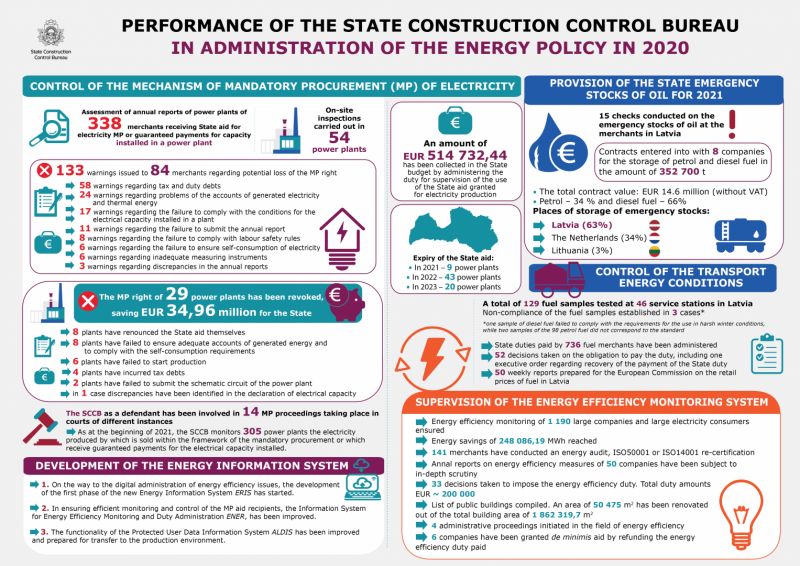It has been one year since the State Construction Control Bureau (SCCB) started performing 16 functions of the administration of the energy policy. Over this time, the SCCB has focused particularly on the control of the mandatory procurement (MP) of electricity, commenced working on extensive improvements in the energy efficiency monitoring system as well as tested fuel quality, and procured State emergency stocks of oil.
Last year, the SCCB has carried out monitoring of all 338 power plants under its supervision, including on-site inspections in 53 power plants receiving State aid for electricity MP or guaranteed payments for electrical capacity installed in a power plant. After on-site visits and assessment of annual reports of all power plants, 133 warning have been issued in total to 84 companies regarding potential loss of the MP right. Last year, the SCCB has revoked the MP right of 29 power plants, thus saving approximately EUR 35 million for the State. “Preparations have been made at the end of 2020 constituting significant improvements to the Information System for Energy Efficiency Monitoring and Duty Administration, ENER, and introduction of digital analytical tools. This will, in the future, allow the Bureau to analyse information and exercise risk-based control of power stations increasing the number of on-site inspections of plants,” explains Svetlana Mjakuškina, Director of the SCCB.
The Bureau has also focused on energy efficiency monitoring of large companies and large electricity consumers by making an in-depth assessment of annual reports on energy efficiency measures of 50 companies and taking 33 decisions to impose the energy efficiency duty on those failing to comply with the requirements of the Energy Efficiency Law. The total duty imposed amounts to EUR 200,000. Four administrative cases have also been initiated for the failure to comply with the requirements. “According to the information provided by merchants, State and local government institutions, the total energy savings of the State have reached 248,086.19 MWh.
We have, however, a new and ambitious energy-saving period ahead of us. We expect that the savings of companies will even shrink to 60 %, therefore particular attention should be paid to the public sector which keeps lagging behind in this respect,” says S. Mjakuškina, referring to the list of public buildings developed by the SCCB as an example. This marks slow renovation of the public sector buildings. Only 50,475 m2 or approximately 3 % of the total area of buildings which is 1,862,319.7 m2 have been renovated.
The process has, however, began, and local governments are starting to address energy efficiency. For example, at the end of last year, Gulbene Municipality Local Government became the first of all the Latvian local governments to enter into a voluntary agreement with the SCCB on energy efficiency improvement.
Last year, the SCCB has successfully completed one of the largest procurements in its entire history – the SCCB has ensured purchase of the service of State emergency stocks of oil for 2021 in the amount of EUR 14.6 million (excluding value added tax) by entering into contracts with eight companies for the total amount of stored stocks amounting to 352,700 tonnes. The procurement organised by the SCCB has resulted in a decrease in the total costs of the storage of oil stocks for the next year, thus allowing merchants to save 14.4 % in respect of payments of the fee for the storage of oil stocks.
In November and December 2020, the SCCB has also carried out sampling and testing for traded fuels at 48 service stations in the entire territory of Latvia. Overall, the fuel quality in the State is good. Out of 129 tested samples only two samples of 98 petrol fuel did not comply with the standard, while in respect of the tests of diesel fuel only one case has been established where the fuel did not correspond to the requirements laid down for winter fuel. It has already been reported that by the end of 2021, the SCCB intends to test a total of 300 samples of diesel fuel and 95 and 98 petrol fuels in the entire territory of Latvia without notifying companies in advance. The fuel quality testing takes place in an accredited laboratory.
Overall, the SCCB has reached important aims in 2020 – at the end of 2020, the quality management system integrated by the Bureau has been certified according to the requirements of ISO 9001:2015. The Bureau has been recognised as a leader in the “Consult First” initiative in the category “Leader in Information and Consulting 2020”,and has occupied the second place in the overall evaluation of the “Consult First” initiative. In demonstrating its orientation towards clients’ needs, in November, the SCCB joined the single website platform of the State administration, thus ensuring that the content posted on the website is also accessible to people with a visual, hearing, motor or perceptual disability.




